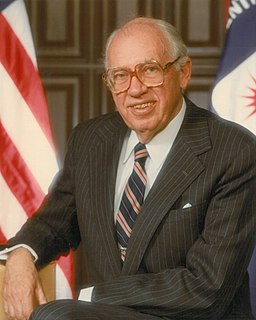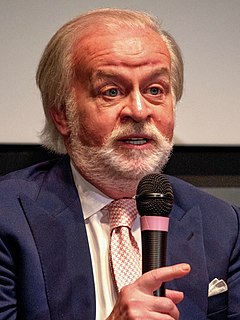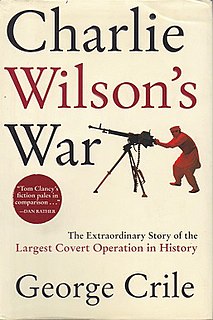
The Iran–Contra affair, often referred to as the Iran–Contra scandal, the McFarlane affair, or simply Iran–Contra, was a political scandal in the United States that occurred during the second term of the Reagan administration. Between 1981 and 1986, senior administration officials secretly facilitated the sale of arms to the Islamist Khomeini government of the Islamic Republic of Iran, which was the subject of an arms embargo. The administration hoped to use the proceeds of the arms sale to fund the Contras, a right-wing rebel group, in Nicaragua. Under the Boland Amendment, further funding of the Contras by the government had been prohibited by Congress.
The Boland Amendment is a term describing three U.S. legislative amendments between 1982 and 1984, all aimed at limiting U.S. government assistance to the Contras in Nicaragua. The first Boland Amendment was part of the House Appropriations Bill of 1982, which was attached as a rider to the Defense Appropriations Act of 1983, named for the Massachusetts Democrat, Representative Edward Boland, who authored it. The House of Representatives passed the Defense Appropriations Act 411–0 on December 8, 1982, and it was signed by President Ronald Reagan on December 21, 1982. The amendment outlawed U.S. assistance to the Contras for the purpose of overthrowing the Nicaraguan government, while allowing assistance for other purposes.

William Joseph Casey was the Director of Central Intelligence from 1981 to 1987. In this capacity he oversaw the entire United States Intelligence Community and personally directed the Central Intelligence Agency (CIA).

Charles Nesbitt Wilson was a United States naval officer and former 12-term Democratic United States Representative from Texas's 2nd congressional district. Wilson is best known for leading Congress into supporting Operation Cyclone, the largest-ever Central Intelligence Agency (CIA) covert operation, which during the Carter and Reagan administrations supplied military equipment to the Afghan Mujahideen during the Soviet–Afghan War. His behind-the-scenes campaign was the subject of the non-fiction book Charlie Wilson's War: The Extraordinary Story of the Largest Covert Operation in History by George Crile III and the subsequent film Charlie Wilson's War, where he was portrayed by Tom Hanks.

The Director of Central Intelligence (DCI) was the head of the American Central Intelligence Agency from 1946 to 2005, acting as the principal intelligence advisor to the President of the United States and the United States National Security Council, as well as the coordinator of intelligence activities among and between the various US intelligence agencies.

The United States Senate Select Committee on Intelligence is dedicated to overseeing the United States Intelligence Community—the agencies and bureaus of the federal government of the United States that provide information and analysis for leaders of the executive and legislative branches. The Committee was established in 1976 by the 94th Congress.

The Office of Legal Counsel (OLC) is an office in the United States Department of Justice that assists the Attorney General's position as legal adviser to the President and all executive branch agencies. It drafts legal opinions of the Attorney General and provides its own written opinions and other advice in response to requests from the Counsel to the President, the various agencies of the Executive Branch, and other components of the Department of Justice. The Office reviews and comments on the constitutionality of pending legislation. The office reviews any executive orders and substantive proclamations for legality if the President proposes them. All proposed orders of the Attorney General and regulations that require the Attorney General’s approval are reviewed. It also performs a variety of special assignments referred by the Attorney General or the Deputy Attorney General.

The United States House Permanent Select Committee on Intelligence (HPSCI), also known as the House Intelligence Committee, is a committee of the United States House of Representatives, currently chaired by Adam Schiff. It is the primary committee in the U.S. House of Representatives charged with the oversight of the United States Intelligence Community, though it does share some jurisdiction with other committees in the House, including the Armed Services Committee for some matters dealing with the Department of Defense and the various branches of the U.S. military.

Gustav Lascaris Avrakotos was an American case officer and the Afghan Task Force Chief for the Central Intelligence Agency.
Clair Elroy George was a veteran of the Central Intelligence Agency's (CIA) clandestine service who oversaw all global espionage activities for the agency in the mid-1980s. According to The New York Times, George was "a consummate spymaster who moved the chess pieces in the CIA’s clandestine games of intrigue".
The presidency of Ronald Reagan in the United States was marked by numerous scandals, resulting in the investigation, indictment, or conviction of over 138 administration officials, the largest number for any president in American history.
The Public Interest Declassification Board (PIDB) is an advisory committee established by the United States Congress with the official mandate of promoting the fullest possible public access to a thorough, accurate, and reliable documentary record of significant U.S. national security decisions and activities. The Board is composed of nine individuals: five appointed by the President of the United States and one each appointed by the Speaker of the House, House Minority Leader, Senate Majority Leader, and Senate Minority Leader. Appointees must be U.S. citizens preeminent in the fields of history, national security, foreign policy, intelligence policy, social science, law, or archives.

Steven Gill Bradbury is an American attorney and government official who served as the General Counsel of the United States Department of Transportation. He previously served as Acting Assistant Attorney General (AAG) from 2005 to 2007 and Principal Deputy AAG from 2004 to 2009, heading the Office of Legal Counsel (OLC) in the U.S. Department of Justice during President George W. Bush's second term.
At various times since the creation of the Central Intelligence Agency, the Federal government of the United States has produced comprehensive reports on CIA actions that marked historical watersheds in how CIA went about trying to fulfill its vague charter purposes from 1947. These reports were the result of internal or presidential studies, external investigations by congressional committees or other arms of the Federal government of the United States, or even the simple releases and declassification of large quantities of documents by the CIA.

The CIA publishes organizational charts of its agency. Here are a few examples.

The President's Surveillance Program (PSP) is a collection of secret intelligence activities authorized by the President of the United States George W. Bush after the September 11 attacks in 2001 as part of the War on Terrorism. Information collected under this program was protected within a Sensitive Compartmented Information security compartment codenamed STELLARWIND.

The CIA Office of Inspector General exists to perform an inspector general (IG) function at the Central Intelligence Agency.

John Anthony Rizzo was an American attorney who worked as a lawyer in the Central Intelligence Agency for 34 years. He was the deputy counsel or acting general counsel of the CIA for the first nine years of the War on Terror, during which the CIA held dozens of detainees in black site prisons around the globe.

Charlie Wilson's War: The Extraordinary Story of the Largest Covert Operation in History is a 2003 book by George Crile III. Upon publication, the book received praise from The New York Times, making it onto their best seller list. The book was also placed on Washington Post and Los Angeles Times best seller lists.

The Michael V. Hayden Center for Intelligence, Policy, and International Security is a think tank in Arlington, Virginia focused on intelligence and national security policy through shared experiences of senior intelligence service leaders, military officers, elected officials, journalists, and academics. It is housed within the Schar School of Policy and Government at George Mason University.














